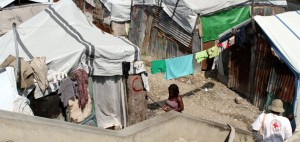When a massive earthquake struck Haiti on 12 January 2010, there were 22 aftershocks in the days that followed. There has been a 23rd aftershock that has not yet stopped, and is just as damaging to peoples’ lives: corruption.
It should be no surprise that corruption has been a barrier to Haiti’s reconstruction. Haiti public sectors is seen as one of the world’s most corrupt, ranked in the bottom ten of Transparency International’s Corruption Perceptions Index.
This year, La Fondation Heritage Pour Haiti, the Haitian chapter of anti-corruption organization Transparency International, has been running a hotline for people to report corruption in aid and reconstruction. We have learned of corrupt practices that are shocking, and saddening.
There are stories of food and medicine not distributed to those who need it most, but put out on the street for private profit, or new marketplaces being built but the best spots being given to vendors who have connections, often familial, to officials.

Photo: Flickr/British Red Cross
Here in Haiti, the average citizen is too often victimized by the sort of corruption that drove Tunisian fruit seller Mohammed Bouazizi to ignite the Arab Spring.
There has been a big improvement in the lot of the survivors, but around half a million people are still without permanent homes. Many of the one million people who are no longer in the displaced persons camps were not helped by the international community and the international celebrities who helped raise US $11 billion in aid pledges.
Having said that, many NGOs, such as Food for the Poor, have invested some of the funds collected to rebuild houses. Government aid agencies have also helped. The United States’ Agency for International Development has built or repaired around 35,000 temporary shelters, housing approximately 143,000 people.
But too little of the funds pledged for Haiti in 2010 reached Port-au-Prince, and many of the homeless simply build themselves new shacks. These shacks are often constructed with poor quality materials in the same “Bidonvilles” that collapsed during the earthquake and are just as vulnerable to another earthquake as the dwellings they had before.
This is a picture familiar to many disaster zones. In 2011, tens of thousands of children died when famine, and with it corruption, returned to the Horn of Africa, as in the response to the 2004 Asian tsunami.
Haitians are also vulnerable to bribery and corruption. Many are in precarious legal situations, paying rent for the lands on which their shacks are built, prey to exploitation and corruption. I know several people who just built their own homes themselves. They do not have access to public services, with extortion in the health sector well documented.
People know all out about the promises from abroad that were made after one of the most devastating earthquakes ever. That only makes them more skeptical when, two years on, they wait to see that help on the ground.
The people of Haiti do not want handouts. They want jobs. They want opportunities to live a normal life. This requires investment from Haiti’s private sector and from abroad, and officials to use public funds openly and fairly.
The best way the international community can help make this happen is to pressure the Haitian government to act transparently, to be accountable to its citizens. Aid agencies and investors alike must work with national and local authorities, while insisting that their relationship is transparent, especially when money changes hands.
The providers of aid must do everything they can to make sure it does not happen, by being accountable to the people they are helping and to the donors of the funds by vetting partners carefully.
The new prime minister has made broad promises in this direction, but so far I would give a bad score, as Transparency International’s Corruption Perceptions Index did last December, 175 out of 182, level with Iraq.
This score is not the fault of the new regime as the new government was installed in October. It is the result of years of public officials not being held to account by Haitian citizens and years of impunity for economic criminals.
Nature has been tough on Haiti, but the worst sides of human nature have also caused flagrant and callous injustice meted out to the most vulnerable, who cannot lay the foundations of a better life while corruption constantly threatens to defeat their efforts.
Corruption will not go away unless citizens can hold governments to account. As long as corruption reigns, Haitians’ attempts to rebuild their lives will be on shaky ground.















 Connect with us on Facebook
Connect with us on Facebook Follow us on Twitter
Follow us on Twitter